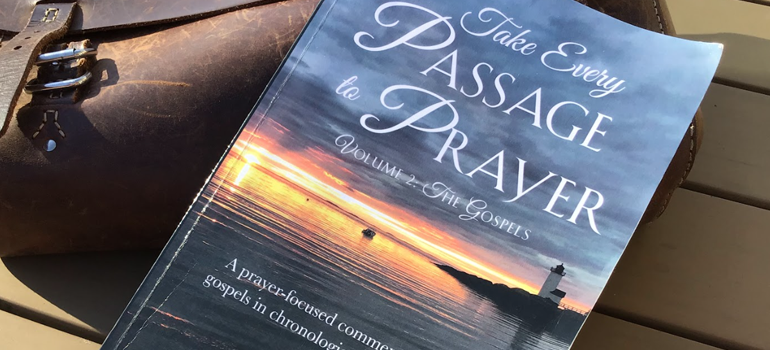The Gramazin Blog

The First Miracle - Turning Water into Wine
Take Every Passage to Prayer - Volume 2, The Gospels
Thursday June 06, 2024
John 2:1-12
Father, each one of us has a role to play in Your Kingdom. For many of us, our role is brief and for a specific purpose. We die after our purpose is complete. For others, such as the apostle John, You may have purposes for them that necessitate they have a long life. Father, what I ask is that Your purposes for my life are accomplished within whatever time I have left. Father, for the sake of being humble before You, please lead me to have a following that consists only of the number of lives that You want me to touch and no more. Please help me to give You my best by giving me the best of the tools and resources I need to do Your work with excellence. I don’t ask for anything more than what I need to do such work well. Amen.
Father, there is wonderful symmetry in the Bible. For example, the Old Testament begins with creation in Genesis 1 while the New Testament ends, in Revelation 21, with the creation of a new heaven and new earth. It is not surprising, therefore, that the first major event in Jesus’ ministry took place at a wedding feast given the last event mentioned in the Bible is the future “wedding of the Lamb” in Revelation 19, when Jesus is forever married to His bride, the church. Two days after His conversation with Nathanael, Jesus was a guest, along with His disciples, at a wedding in Cana in Galilee. However, He will be the bridegroom at the wedding in Revelation.
The text tells us that Mary, Jesus’ mother, was also a guest at the wedding . It has been 18 years since the events of Luke 2:41-52, the last time we read about Mary. In that passage, Mary was upset that 12-year-old Jesus had gone missing in Jerusalem. It is most likely that Mary is now the mother of five sons and, at least, two daughters (Mark 6:3). It is also likely, given that people married in their teens back in that culture, that at least one or more of Jesus’ siblings has been married by this time and Jesus may have multiple nephews and/or nieces. Mary’s now extensive family may also be present at this wedding. It is also noteworthy that there is no reference to Joseph in this vignette from Jesus’ life. He may have been present at the wedding but was not relevant to the story. His absence from this story could also be explained by his being too busy with work in his carpentry business to attend the wedding. It is also possible that Joseph is no longer present in the family, perhaps having passed away. Some have speculated that another reason why Jesus waited to the age of 30 to begin His ministry was because He helped raise His younger siblings throughout His twenties in the absence of Joseph.
The text states that all of the wine had been consumed by the guests. While we may consider this no big deal in our day, this was scandalous in Bible times. A wedding was the most important event in a family’s life. It was the one thing a father and mother made sure they got right, even to the smallest of details. Given that a marriage was similar to a business contract between the fathers, failure to provide enough wine is a failure to fulfill the terms of a contract. There were potential legal implications of running out of wine. It was certainly a huge social faux pas that would embarrass and haunt the family for years. Mary, who most likely was friends of the parents, felt compassion on their predicament. She whispered to Jesus, “Jesus, they ran out of wine.”
Jesus clearly interprets His mother’s motive for telling Him about the wine. He believes she wants Him to “come out”, so to speak, at this wedding, in front of all of these guests, and show that He is truly the Son of God. She most likely still has a reputation in the community for her alleged promiscuity that led her to have a baby out of wedlock thirty years before. If Jesus would perform a miracle, right here and right now, everyone would finally know that she was innocent all along, and that she truly did give birth to the Son of God. Mary felt it was safe to ask this of Jesus since He had already officially begun His public ministry, having been baptized by John the Baptist the previous month.
Jesus replied to his mother by saying:
“Woman, why do you involve me? My hour has not come.”
Wow. At first glance, Jesus seems to be annoyed and disrespectful to His mother. Why didn’t He call her “Mother”? Which one of us would find it good manners to refer to our mother as “woman”? However, if we are to believe that Jesus was sinless (1 Peter 2:22), and we are to believe He knew the Ten Commandments (Exodus 20:12, Mark 10:19), His response here cannot be disrespectful. The Greek word used for woman is gyn?. It is used to refer to any woman, whether she is a virgin, married, or widowed. Jesus is quoted as using this term for a woman four times during His ministry:
- Speaking to the Canaanite woman in Matthew 15:28 (mother of demon-possessed daughter).
- Jesus heals the crippled woman in Luke 13:12 (woman is crippled).
- Speaking to the Samaritan woman in John 4:21 (woman caught in adultery).
- When Jesus asks John to take care of His mother in John 19:26 (His soon-to-be grieving mother).
In each of these situations, Jesus had compassion for the woman to whom He was addressing. Therefore, Jesus uses the term “woman” endearingly and lovingly. Why did He not call her “mother”? I suggest Jesus knew that Mary was going to be venerated in future generations. He also knew He was about to be quoted and that His quote would appear in the gospels. I believe Jesus wanted to send a message that, as wonderful a mother as Mary had been for Him, she is like any other woman in history - a woman who needs a Savior.
There are several occasions in the gospels where Jesus shied away from celebrity.
- Jesus asked the man whom He healed of leprosy not to tell anyone (Matthew 8:2-4, Mark 1:40-45, Luke 5:12-14).
- Jesus asked the two men whom He healed of blindness not to tell anyone (Matthew 9:30).
- Jesus raised a dead girl back to life and then commanded the family not to tell anyone (Mark 5:21-43, Luke 8:40-55).
- Jesus healed a deaf and mute man and commanded him not to tell anyone (Mark 7:31-37).
- Jesus told His disciples not to reveal that He was the Christ (Matthew 16:20, Mark 8:27-30, Luke 9:18-21).
- Jesus told the crowds not to reveal who He was (Matthew 12:15-16).
- Jesus told those who witnessed the Transfiguration not to tell anyone (Matthew 17:8-10, Mark 9:2-13).
- Jesus told demons not to reveal who He was (Mark 1:34, Mark 3:12, Luke 4:41).
- Jesus refused to admit who He was when questioned (Matthew 21:23-27, Mark 11:27-33, Luke 20:1-8).
This runs counter to the advice public relations or marketing professionals would give Him today. The more people know about the miracles He performed, the more His miracles will go “viral”. He will have millions of social media followers overnight. However, Jesus is concerned about unwanted celebrity:
- He is humble in character. (Matthew 11:29, Mark 10:45, 2 Corinthians 8:9)
- He wants God to receive all the glory. (John 14:13)
- He doesn’t want to draw the attention of those who would want to kill Him too soon. He is to die in Jerusalem on the cross in three years and not beforehand. (John 11:45-54)
- He doesn’t want His message lost in the noise of people wanting to see His “magic tricks”. (Matthew 11:20)
- He wants to be able to have private time with His Father, away from the crowds. (Mark 1:35-37)
- He wants to be able to freely move around the region without being hemmed in by crowds. (Matthew 8:18)
- He didn’t want to be tempted by being a celebrity. (Matthew 6:13)
Therefore, it is not difficult to conclude that Jesus statement, “My hour has not come”, is His righteous soul crying out not to have to encounter celebrity yet. If He performs the miracle His mother is asking, word will get around and He will become famous in the region. He doesn’t want fame. He wants to quietly build His team of disciples and touch lives one village or town at a time.
According to John 2:5, Mary ignored Jesus and instructed a servant to, “do whatever He tells you.” Father, I believe this is an endearing portrait into a close relationship between mother and son. Mary knows that Jesus loves her. Mary knows that Jesus enjoys serving His mother. Mary knows that Jesus is always eager to please His mother. Mary is certain that, once more, Jesus will do as she asks, even if He would rather not. She no doubt instructed the servant with confidence in Jesus’ response and a victorious smile on her face.
The home where the wedding took place had six stone water jars that each held twenty to thirty gallons (????????, Greek) , “the kind used by the Jews for ceremonial washing” (NIV). We can assume, therefore, that the man of the house is a priest in the community and that the servants in this story are indicators of his wealth. The guests at this wedding are most likely the elite of society who are accustomed to extravagance. They know quality wine when they taste it.
Jesus concedes to His mother’s wishes as Mary expected. He instructed the servants to fill the six stone jars with water. Somewhere between the last bucket of water poured into the sixth jar and the first ladle of water being placed into one of the jars to fill a cup, the water had turned to wine. It was not just your everyday wine. It tasted as good as the best wine the guests had ever tasted. The master of the banquet complimented the bridegroom for saving the best wine for the last.
Father, what do we learn about Jesus in this passage? In the spirit of Jeremiah 29:11, when Jesus gives us something that we need, He gives us the best. Though this statement is certainly not advocating for the “health and wealth gospel”, we do say without reservation that Jesus will give us the best gifts that we need, not for the sake of our comfort, but for the sake of touching lives for Christ and to glorify the Father in heaven (Hebrews 13:20-22).
Our text tells us that this was the “first of the signs (???????, Greek) through which he revealed his glory; and his disciples believed in him (NIV).” This was no mere man that His disciples were following. It was none other than the Son of God who exercises authority over all the laws of chemistry, biology, physics, mathematics, and science. Jesus left the wedding with His mother, brothers, and disciples, and went down to Capernaum where they stayed for a few days. Amen.
Footnotes
98. Were Nathanael and Bartholomew the same person? If so, why does John refer to him as Nathanael, but Matthew, Mark, and Luke refer to him as Bartholomew? There is no reference to “Nathanael” in the synoptic gospels. There is also no reference to “Bartholomew” in John’s gospel. This would make sense if the same man were known by two different names. This would also make sense if we are referring to two different men. If we are referring to two different men, Cana was Nathanael’s hometown (John 21:2). The only two verses in the Bible that specifically reference the town of Cana link the site of a wedding to Nathanael’s birthplace. We also have the text about Nathanael’s conversation with Jesus occurring immediately before the text about a wedding, as if the author thought it was important to first mention how Jesus met the groom before writing about the wedding itself. One possible explanation for the absence of the godly Nathanael throughout the gospels, and why he did not become one of the twelve disciples, is that he was a devoted husband. Was this his wedding? We know Nathanael knew Philip and Philip was one of the disciples and that Jesus and the disciples were invited to the wedding (John 2:2). If Nathanael were a devoted husband, and specifically a newlywed, he could not travel around the region with Jesus, leaving his bride alone (see Deuteronomy 24:5). Jesus may have told Nathanael to stay home and bring happiness to his wife. This logic does not apply to the fact that we know Peter was also married (Matthew 8:14). However, he may have not been a newlywed. Pure speculation only. If Bartholomew and Nathanael are the same person, this theory falls apart since Nathananel-Bartholomew was an active member of one of the twelve disciples.
99. As we discussed earlier, the typical marriage of the day was contracted by the two fathers. The bride and the groom had less independence than couples have in 21st century America. After the deal was closed, the groom would return to his home and prepare a place for his bride to live with him. When he had completed the task, he would return to her and bring her back to his home to live with him. A wedding feast would then celebrate that the contract had been fulfilled and the bride delivered to her groom.
100. We read in Numbers 4:2-3 that a priest should not begin his service until the age of 30. Hebrews 4:14 describes Jesus as the ultimate High Priest.
101. Wine in ancient Mesopotamia may have been flavored by grapes, honey, herbs, figs, and pomegranates.
102. Enjoying a brief moment of humor here, while it is likely Mary followed that statement with a specific request for Jesus to perform a miracle, the absence of such a direct request in the text, coupled with Jesus’ response, suggests that this was one of those times men throughout history can attest to when a woman hints about what she wants without directly asking for it.
103. We assume this wedding is taking place after Jesus’ 40 days in the wilderness which took place after His baptism by John the Baptist.
104. Mary is most likely of the poor or working class. This servant is not likely to be her servant but someone serving tables at the wedding.
105. The Greek word that has been interpreted as “gallon” is ????????. According to the Blue Letter Bible, itis said to represent approximately 9 English gallons or 10.8 US gallons. Therefore, the capacity of these six jars combined is an estimated 1,296 to 1,944 US gallons (20 or 30 gallons per multiplied by 10.8 per multiplied by 6 jars). The average gas tank for a car in the 21st century is 12 gallons. Therefore, these stone jars held the same amount of liquid as approximately 108 to 162 automobiles with full tanks today. Let’s estimate that the typical American drinks about 4 eight-ounce glasses of water a day, or 1/4 of a gallon. Therefore, based on the total capacity of the six stone jars, if everyone at the wedding drank their daily quota of water from these 6 stone jars, an estimated 5,000 to 7,500 people at this wedding could be served their daily serving of water. While I find it hard to believe this wedding had that many guests, it does suggest this was a significantly important wedding with many influential people as guests. This adds all the more significance to Mary’s concern about there being enough wine and Jesus’ concern that it could cause Him to become a celebrity overnight.
106. The master of the banquet was most likely the father of the groom. Ancient wedding custom called for the bridegroom to bring his bride back to the home he prepared for her, which was in proximity to his parent’s home. It is in this location that the wedding celebration occurs. It is likely that the bridegroom was given the responsibility to provide the wine for the wedding. This would also match the “marriage supper of the Lamb” in Revelation 19 where Jesus is the bridegroom (Matthew 26:19).
107. “???????” is Greek for what we might refer to as a brand in 21st century America. The signs made Jesus unique among all others. A sign is also outside of usual occurrence - it is a miracle, something that can only be credited to God. In short, this is the first of the many miracles that separated Jesus from all the other teachers of the day. No one else could do the miracles that He could do.
108. Capernaum is on the northern shore of the Sea of Galilee. The town is prominent in the gospels as a place Jesus often visits. The people in this community were reluctant to embrace Jesus. In fact, in Matthew 11:20-24, Jesus states that the entire city is going to hell. Significant sections of ancient Capernaum have been uncovered by archeologists.







